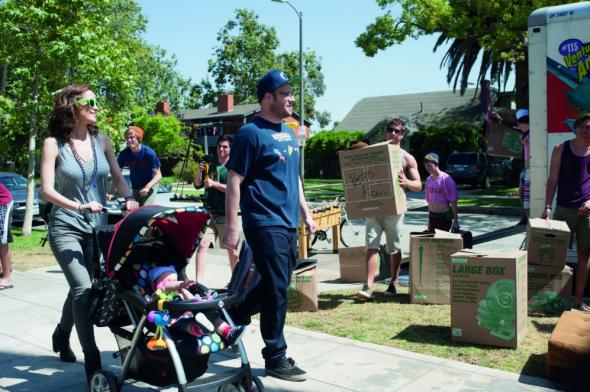When Harold Ramis died earlier this year, many remembrances mentioned that he left behind Judd Apatow as perhaps his most direct descendant. Like Ramis, Apatow has surrounded himself with a constellation of mostly male, often slobbish comedians: Where Ramis had Bill Murray, Chevy Chase, and Dan Aykroyd, Apatow has Seth Rogen, Jonah Hill, and Jason Segel. And like Ramis, Apatow has had his hand in an astonishing number of the most successful comedies of his era: Where Ramis had Animal House, Caddyshack, Groundhog Day, and Ghostbusters, Apatow has The 40-Year-Old Virgin, Superbad, Knocked Up, and Bridesmaids.
The parallels between the two writer-directors are not a coincidence. Apatow, who interviewed Ramis for his high school radio station when he was a teenager, says he viewed Ramis as “the person that I wanted to be when I was growing up.” He added that he cast Ramis to play the protagonist’s father in Knocked Up “because we all saw him as the dream dad.”
But on an episode of the Slate Culture Gabfest taped shortly after Ramis’ death, Stephen Metcalf pointed out the fundamental difference between Ramis’ troupe and Apatow’s. The movies of Harold Ramis and his fellow pranksters from the National Lampoon and SCTV—who came up during Vietnam and Watergate—pit the slob heroes vs. a villainous, authoritarian institution. Animal House is perhaps the most obvious example: It’s Bluto and the boys, who are trying to avoid the draft, vs. the administration. Similarly, Stripes sent up the military, Caddyshack sent up the country club, and Ghostbusters sent up academia and city government. (“Personally, I like the university,” says Aykroyd’s Dr. Stantz. “They gave us money and facilities and we didn’t have to produce anything.”) In Apatow comedies, on the other hand, it’s “much more peer-based,” as Metcalf put it. It’s the slobs vs. each other, or vs. themselves.
The latest movie from the Apatow crew, Neighbors—directed by frequent Apatow collaborator Nicholas Stoller (Forgetting Sarah Marshall, The Five-Year Engagement) and co-produced by Seth Rogen and Evan Goldberg (who co-wrote the Apatow productions Superbad and Pineapple Express)—takes this generational shift to its logical end. It borrows the central conflict of Animal House and turns it upside-down, so that the responsible protagonists are the heroes, and the slobbish frat boys are the villains. In Animal House, our heroes, the Deltas, spend the whole movie fighting the dean because he wants to kick them off campus. In Neighbors, the Deltas are the enemies, and it’s our heroes the Radners (Seth Rogen and Rose Byrne) who spend the whole movie trying to shut them down. When the Radners fail to deal with the Deltas on their own, one of their first moves is to take their grievances to the dean.
This turn might seem surprising coming from a crew that made their name on movies about overgrown children. But the counterintuitive thing about Judd Apatow’s man-child movies is that they’re actually all about growing up and accepting responsibility. The 40-Year Old Virgin is about learning to get rid of your action figures. Knocked Up is about owning up to the consequences of a one-night stand. Funny People is about the dangers of not growing up (and about staying loyal to your partner). And This Is 40 is about coming to terms with middle age. This applies to many (if not all) of the movies from Apatow’s circle of collaborators, too: The Five-Year Engagement, for example—Nicholas Stoller’s previous movie—is about learning to embrace commitment and make sacrifices for your partner. (The closest thing Animal House has gotten to a successful sequel, meanwhile, is Todd Phillips’ Old School, which predates the rise of the Apatow generation and was actually co-produced by Animal House producer Ivan Reitman—perhaps Ramis’ closest collaborator.)
Neighbors seems quite conscious of this reversal. In fact, it’s the central theme of the movie: The Radners must come to terms with the fact that they’re becoming scolds. Nobody wants to be the neighbors calling the police with noise complaints, but sometimes the kids just won’t listen. And while we see things from either side of the battle line—sometimes the adults are worse than the kids—our sympathies are ultimately with the Radners. The bonds of marriage prove stronger than the bonds of fraternity.
The movie ends with the kind of talk that would make Flounder barf or Bluto want to smash things: Seth Rogen and Rose Byrne coo to each other about such pleasures as the smell of fresh coffee grounds. (It’s a joke, except that it’s not.) And then they decide to stay in to work on their annual calendar of baby photos. This resolution suggests that the Apatow crew is making peace with what they’ve been headed toward all along: becoming responsible adults.
